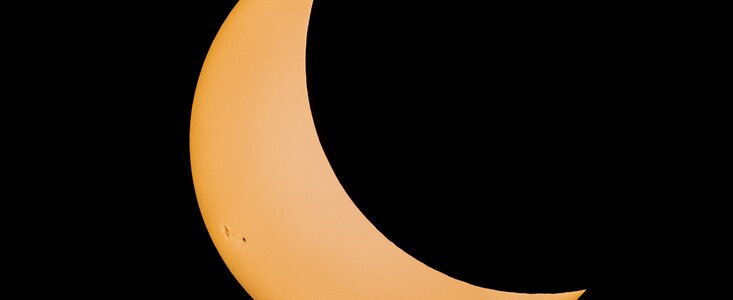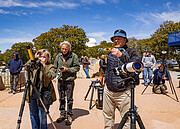Join Us at Kitt Peak National Observatory for the 8 April 2024 Solar Eclipse
Witness the partial solar eclipse from a desert mountaintop among dozens of world-class telescopes
22 March 2024
Come join us at the Kitt Peak Visitor Center on 8 April from 9 a.m. to 1 p.m. to view the partial solar eclipse! Located at Kitt Peak National Observatory, a Program of NSF’s NOIRLab, this walk-around style event will give visitors a unique opportunity to watch one of the most exciting astronomical events of the decade from the largest observatory in the country while surrounded by dozens of research-grade telescopes.
While we will not be seeing the totality of the eclipse, we will still see 70% of the Sun’s diameter covered by the Moon.
Arrive at the Visitor Center any time between 9 a.m. and 1 p.m. to join us in telescope viewing, using special eclipse glasses and more! A light meal is included for anyone attending.
The eclipse will begin at 10:05 a.m. MST and will last about 2.5 hours. We recommend arriving at 10 a.m. for the best eclipse views.
Tickets are on sale now. One set of eclipse glasses is included in the ticket price per person.
More information
NSF’s NOIRLab (National Optical-Infrared Astronomy Research Laboratory), the US center for ground-based optical-infrared astronomy, operates the International Gemini Observatory (a facility of NSF, NRC–Canada, ANID–Chile, MCTIC–Brazil, MINCyT–Argentina, and KASI–Republic of Korea), Kitt Peak National Observatory (KPNO), Cerro Tololo Inter-American Observatory (CTIO), the Community Science and Data Center (CSDC), and Vera C. Rubin Observatory (operated in cooperation with the Department of Energy’s SLAC National Accelerator Laboratory). It is managed by the Association of Universities for Research in Astronomy (AURA) under a cooperative agreement with NSF and is headquartered in Tucson, Arizona. The astronomical community is honored to have the opportunity to conduct astronomical research on Iolkam Du’ag (Kitt Peak) in Arizona, on Maunakea in Hawai‘i, and on Cerro Tololo and Cerro Pachón in Chile. We recognize and acknowledge the very significant cultural role and reverence that these sites have to the Tohono O’odham Nation, to the Native Hawaiian community, and to the local communities in Chile, respectively.
Links
- Get your KPVC Solar Eclipse Event tickets here
- Images of the Kitt Peak Visitor Center
- Images of Kitt Peak National Observatory
- Site map of Kitt Peak National Observatory
Contacts
Lorelei Stone
Public Program Specialist
NSF’s NOIRLab
Email: lorelei.stclair@noirlab.edu
Josie Fenske
Jr. Public Information Officer
NSF’s NOIRLab
Email: josie.fenske@noirlab.edu






